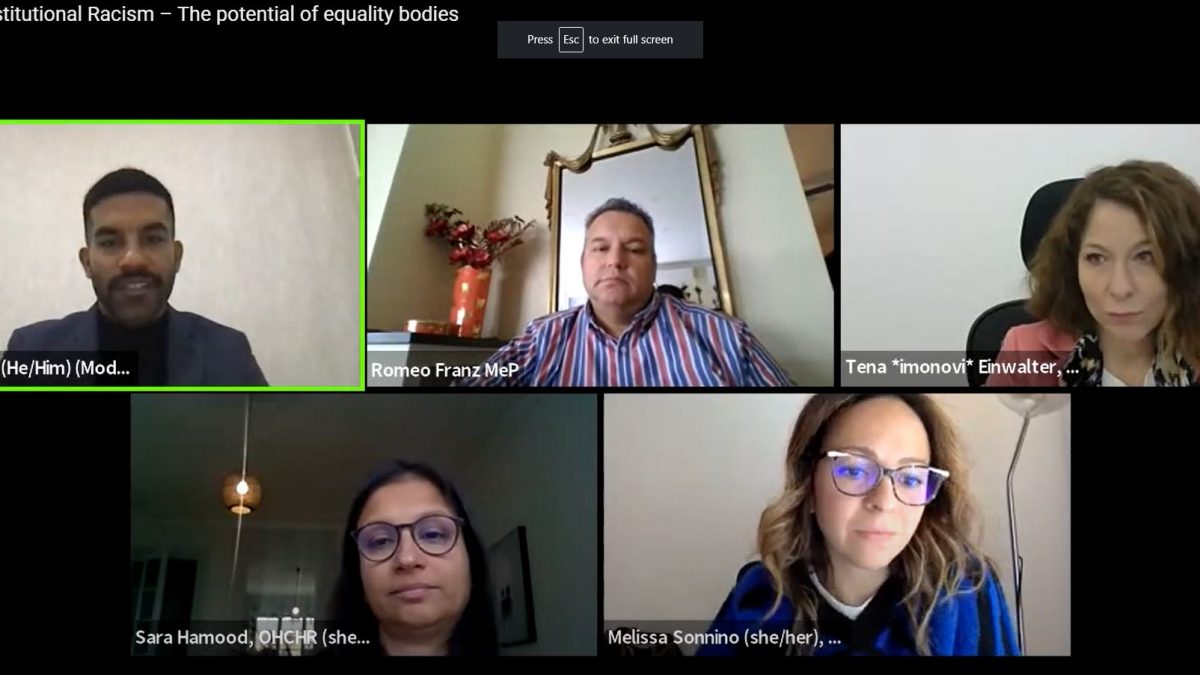It is crucial to identify institutional racism and then to raise public awareness and change how the institutions function in order to tackle it. The importance of these steps has been recognized in the EU’s 2020 Anti-racism Action Plan as well.
European Network of Equality Bodies (Equinet) hosted on 9 December 2021 an online conference on the topic of the potential of equality bodies in tackling institutional racism. Ombudswoman Tena Šimonović Einwalter spoke at the event as head of Croatian national equality body and expert with a broad insight into the subject.
Institutional racism is a specific form of structural racism, strongly connected with racial and ethnic discrimination and resulting from the deeply rooted negative attitudes of the public and official or unofficial stakeholders and structures towards the various racial and ethnic groups. The EU Anti-racism Action Plan adopted in 2020 places special focus on institutional racism and represents an important element in the efforts to tackle this form of racism at the EU level.
Equality bodies (in Croatia this mandate is performed by the Office of the Ombudswoman) play a crucial role in combating discrimination. With that in mind, the conference brought together equality body staff, experts in the field, as well as representatives of civil society organizations and European bodies and institutions to discuss the possible means and avenues for tackling institutional racism in Europe. The conversations touched upon the importance of reliable and comprehensive data on the prevalence of racism and discrimination, the political will to recognize structural racism and take the steps necessary to eliminate it, and the cooperation between the various bodies and institutions and other stakeholders such as civil society organizations and communities exposed to structural racism. Discussions also centered on the role of equality bodies and the EU standards applying to them. It is crucial for these standards to be normatively defined and legally binding at the EU level in order to ensure the independence of these bodies as well as equal conditions and resources for their work throughout the Union.
Ombudswoman Šimonović Einwalter emphasized the importance of cooperation between stakeholders on different levels in order for the efforts to combat structural racism to be successful. Our institution, thus, fosters cooperation with the civil society organizations, the academia, the religious communities as well as the public administration, the Government, the Parliament, cities and municipalities at the national, and other equality bodies, European institutions and international organizations at the European and the global levels.
In order to be able to perform their tasks efficiently – to report on the human rights situation in their country, including through their annual reports, to inform the public on the incidences of discrimination, participate in the drafting of the laws and strategic documents and to solve the citizens’ complaints efficiently, it is important that various institutions provide equality bodies with access to data and information. “At the same time, the independence of equality bodies needs to be upheld at the national level and the forthcoming binding legislature at the EU level on the standards for equality bodies will be of crucial importance here. We have been advocating for it for a number of years now and have been working with the European Commission to make this happen. The fact that this project is now in the realization phase is quite a positive development,” stressed Ombudswoman Šimonović Einwalter.
At the national levels, equality bodies need to engage in various forms of cooperation with the aim of tackling structural racism, such as organizing training sessions for the employees in the public administration and the public services, such as law enforcement, judges and state attorneys.
Their work also includes cooperation with the civil society as well as the very communities affected by institutional racism. Our institution, for instance, has engaged for a number of years now, in regular visits to the Roma settlements in the country and the conversations with their inhabitants. This has contributed to the development of trust and cooperation and has enabled us to contribute to combating anti-Roma discrimination and to raising the level of Roma inclusion more efficiently.
Other useful methods in our work include conducting surveys on the prevalence, roots and forms of stereotypes and prejudice as well as data collection for our annual reports on the human rights situation in the Republic of Croatia via the contributions of the civil society organizations, who inform us on the difficulties the citizens face in exercising their rights and freedoms. We maintain regular contact and information exchange with the CSOs as well via our Network of Antidiscrimination Contact Points and other forms of cooperation.
Another example of cooperation of our institution with other stakeholders is our Human Rights Council. It is the Ombudswoman’s advisory body that considers and proposes strategic guidelines in the field of promotion of human rights and freedoms and ensures permanent cooperation in the field of human rights and freedoms between the Ombudswoman, civil society, academic community and the media.
At the national level, examples of good practice of stakeholder cooperation in combating structural and institutional racism include the Working Group for Hate Crime Monitoring as well as the informal Coordination for Tackling Statelessness. Both of these structures deal with various forms of structural and institutional discrimination and their members come from different institutions, civil society organizations as well as our institution.
When it comes to developing cooperation, especially with the CSOs and social groups exposed to structural racism, the forging of trust is crucial, as well as aiming for the highest standards in our own work and advocating for a normative framework that will ensure a certain level of independence and effectiveness of equality bodies, stressed the Ombudswoman.
The recording of the conference “Tackling Institutional Racism – The Potential of Equality Bodies” is available here.


